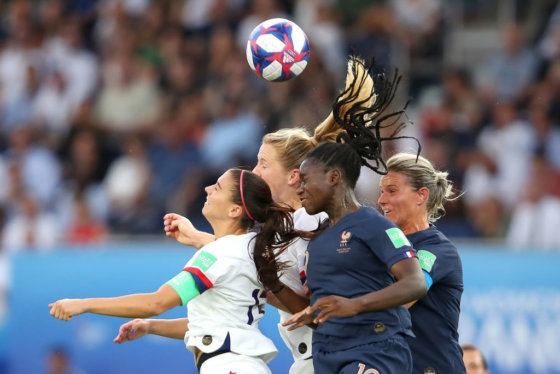In their first World Cup match Tuesday, the U.S. women’s national team made quite the statement with a 13-0 victory over Thailand.
Their domination set records for most goals scored by a team in any men’s or women’s World Cup match and for largest margin of victory in a World Cup match.
And in a game where scoring isn’t as plentiful as, say, the NBA, there has been criticism that the U.S. both celebrated a little too much and ran up the score.
While the former might be up for debate, the latter isn’t, said Christine Brennan, a USA Today columnist and ABC Sports commentator. Goal differential (i.e., the difference between goals scored and goals allowed) matters in the tournament’s group stage.
(An illustration for those of you who don’t follow soccer as much: The U.S. and Sweden are currently in first and second place, respectively, in the Group F table with 3 points apiece. What puts the U.S. on top is this ridiculous goal differential of 13. The Swedes could only cough up a pair of goals in their match Tuesday against Chile, giving them a measly differential of 2.)
“Now, it sounds outlandish to think that Sweden might do something similar to what the U.S. did against Thailand [in Sweden’s upcoming match Sunday], but potentially it’s out there,” Brennan told WTOP’s Shawn Anderson and Hillary Howard.
“And if Sweden were to score 12, 13, 14 goals again — it sounds kind of ridiculous — then people would say, ‘Well, why didn’t the U.S. try to score more?’ And that is why you just keep your foot on the accelerator in these kinds of games, as difficult as it could be.”
Their boisterous dominance comes amid a lawsuit against the U.S. Soccer Federation for pay equity. They contend that top women’s players have made only 38 percent of what comparable U.S. male players have made.
Recent performance bonuses illustrate an even worse disparity. The U.S. men’s 2014 World Cup roster got a performance bonus of nearly $5.4 million after they were bounced out of the round of 16. The women received a bonus of $1.72 million when they won the World Cup a year later.
(The U.S. men’s national team did not qualify for the 2018 World Cup.)
“Sure, part of it is: ‘Hey, we want to show everyone we mean it, that this is a big deal for us, it’s a big deal for future generations of girls and women,'” Brennan said.
As for the celebration, Brennan counted herself among those who believe one should act like they’ve been in the end zone before, to borrow an American football metaphor. “I think on the ninth, 10th, 11th, 12th, 13th goals, maybe the celebration could’ve been toned down a little bit,” she said.
Tuesday’s lopsided win is no doubt resonating with the rest of the field: Brennan believes that “now they are targeted.”
“The U.S. better win this thing,” she said. “Because I think otherwise, people will come back and point to this as a potential controversial moment that may be something that looms bigger later on.”
Up next for the U.S. is Chile. Kickoff is at noon Sunday.
The Associated Press contributed to this report.







